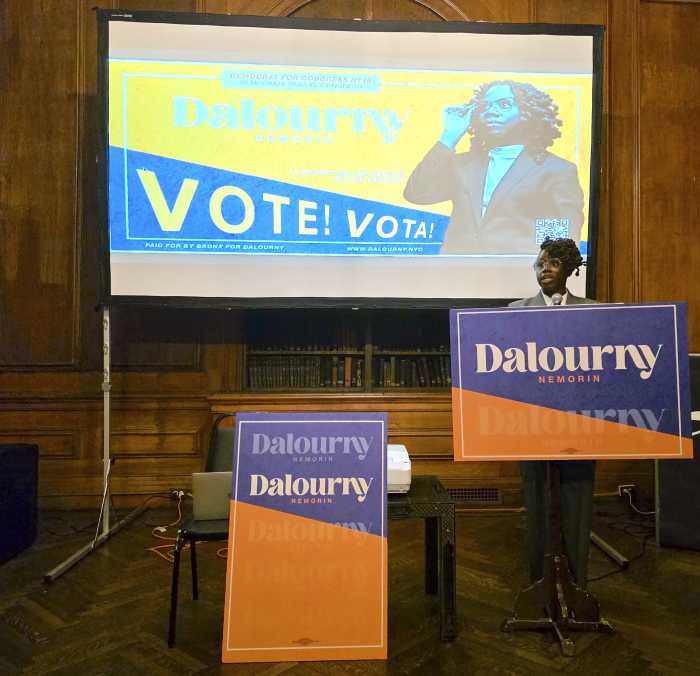YALE UNIVERSITY PRESS
The publication of “The Leonard Bernstein Letters” by Yale University Press is an event of considerable importance — providing insight into both an artistic original and broader cultural themes, as well. What editor Nigel Simeone has assembled in this volume — which includes missives from friends and collaborators, Aaron Copland, Jerome Robbins, Comden and Green among them, as well as from the man himself — reveals far more than a conventional biography ever could.
In reading what Bernstein had to say about his life what impresses is not just the breadth and depth of his achievements as a composer, conductor, teacher, and very public intellectual, but the light it often inadvertently sheds on gay life in the latter part of the 20th century. And said light is sometimes shining from between the lines. For while Simeone has done a remarkable editorial job overall, being straight and sub-culturally myopic, matters that pop off the page and right into today’s gay reader’s face mean little to him.
“Felicia Montealegre was the love of his life,” Simeone declares with absolute certainty. One can say that’s true only insofar as this elegant Costa Rican-born actress, who married Bernstein in 1951 and bore him three children, was the most important woman in his life.
Bernstein letters illuminate an artist’s life and a cultural epoch
But when it comes to sexual as well as romantic love, Montealegre was forced to stand and wait her turn in a line that contained a great many men. “You are a homosexual and may never change,” she wrote to Bernstein not long after they were married. “Let's try and see what happens if you are free to do as you like, but without guilt and confession, please!… Our marriage is not based on passion but on tenderness and mutual respect. Why not have them?”
In other words Montealegre entered, with eyes wide open, into what was called in that time “a New York Marriage.” He could have all the “boys on the side” he wanted, as long as he was “discreet” about it. This was far from an unusual arrangement. It was in act common in those days for well-heeled “Wills” to marry their “Graces.” And if both were same-sex oriented (as was the case with Cole and Linda Porter, and Paul and Jane Bowles) so much the better. Societal acknowledgement of the sexual truth was out of the question back in the day. It would cast one into that gutter inhabited with those with what pulp paperbacks called “strange twilight urges” — outcasts subject to arrest, incarceration, and in some truly egregious “worst case scenarios,” prefrontal lobotomy. Being “a homosexual” meant you were not simply “immoral” but “neurotic” and ipso facto criminal. Marriage to a woman, particularly for the socially ambitious likes of Lenny, was the only way to go.
In his letters to clarinetist — and later classical recording producer — David Oppenheim, Bernstein quips, “I almost married Rhoda [Saletan] last night, but stopped when I saw Judy [Holliday] and decided to marry her.” He was of course “kidding on the square.” And ironically it was Oppenheim who ended up with Holliday in a marriage that lasted for nine years and produced a son. He married two additional times and fathered several children. But that can’t be guessed at in his letters to Lenny, where these intimate friends are in anguish over what to do with their sexuality. Both were seeing Marketa Morris, a noted analyst they refer to as “the Frau.”
“You are seeing Felicia and the day she leaves you have to see a boy. The same old pattern. You can't give up,” “the Frau” writes to Lenny — who disagrees with her: “Felicia and I grow closer all the time. She’s an angel, and a wonderful companion. I shouldn’t be surprised if it works out beautifully in the end.” But before reaching that end, there were those such as the “boy” the “the Frau” refers to — a grown man in actuality, actor Farley Granger.
“My visible verb, my very Dear” Farley writes to Lenny thanking him for a gift of (obviously quite expensive) cuff links. “But the thing with me is that I don’t feel that I have to wear something you gave me, to be reminded of how much I love you.” Granger goes on to note, “I am having Dinner with Felicia tonight. She is a great girl, and I’m sure loves you very much.” No wonder then that Lenny asked Farley to accompany him on the trip to Costa Rica where he sealed the deal with a formal marriage proposal to Felicia. Taken aback, Granger respectfully declined.
For outre as this request may seem, it typifies Bernstein’s desire to have everything. He was a classical composer (“Age of Anxiety,” “Jeremiah,” “Kaddish” ) a “popular” one (“On the Town,” “Wonderful Town”), and sometimes in between the two (“West Side Story,” “Candide,” “Trouble in Tahiti”). Imperfect husband he may have been, Bernstein was nonetheless a wonderful father and a wildly enthusiastic friend to his many collaborators. And to himself he was gay and straight.
Leonard Bernstein with Aaron Copland. | LIBRARY OF CONGRESS/ COURTESY: YALE UNIVERSITY PRESS
In 1967, he cheekily writes to Stephen Sondheim: “I hope you’re loving somebody regularly and in bed,” clearly indicating that his “West Side Story” collaborator, now well on his way to a fabulous career of his own, liked his amour served al fresco. That wasn’t for Lenny. He was doubtless amused when Aaron Copland wrote to him that in Los Angeles, “There are even the same extraordinary young men with wavy hair and impeccable complexions who used to be on Hollywood Blvd. — still around.” But while Bernstein could get casual sex aplenty, what he wanted was to rein it in through societal convention.
His reasoning on this score can be seen in a letter to his sister Shirley: “How strange that you have written to me just now of Felicia! Ever since I left America she has occupied my thoughts uninterruptedly, and I have come to a fabulously clear realization of what she means — and has always meant — to me. I have loved her despite all the blocks that have consistently impaired my loving-mechanism, truly and deeply from the first. Lonely on the sea, my thoughts were only of her. Other girls (and/or boys) mean nothing.”
That wasn’t of course entirely true. In his letter to Shirley he continues, “I have been engaging in an imaginary life with Felicia, having her by my side on the beach as a shockingly beautiful Yeminite boy passes — inquiring into that automatic little demon who always springs into action at such moments.” In short, marriage would keep that ‘little demon” at bay. Did he really believe this or was he “talking himself into it?” In 1952 he writes to his intended, “In any case my dearest darling ape, let’s give it a whirl. There’ll be a crisis (?) from time to time but that doesn’t scare me anymore. And let’s relax in the knowledge that neither of us is perfect and forget about being HUSBAND AND WIFE in such strained capital letters, it’s not that awful!”
“It’s not that awful” may not sound terribly romantic. But Felicia knew this “New York Marriage” would be very special, what with Lenny’s star rising in the arts and their intersecting circles of friends who made their parties the envy of all New York. The most (in)famous of these parties was given on January 14, 1970 when Otto Preminger, Jean Vanden Heuvel, Peter and Cheray Duchin, Sidney and Gail Lumet, Cynthia Phipps, Barbara Walters, Bob Silvers, Richard Avedon, Arthur Penn, Julie Belafonte, Peter Stone, Sheldon Harnick, and Burton Lane were assembled for a soiree where Simeone notes: “Also present were Black Panther Party members Robert Bay, Donald Cox, and Henry Miller, as well as some wives of the accused.” Black “militants” who had dared to purchase guns to protect themselves and their community from the racist Oakland California police, the Panthers were (falsely) accused of planning to bomb the US Capitol. “Members of the press were not invited to the event, but Charlotte Curtis of the New York Times and Tom Wolfe of New York Magazine somehow managed to slip in,” Simeone says.
Leonard Bernstein had never hidden his liberal sympathies. While by no means so far left as to be associated with the Communist Party, he was listed as being a virtual one in the McCarthy era pamphlet “Red Channels” — a fact that often created difficulty when he needed a passport to work overseas and the government was chary of allowing him permission.
But this inconvenience was as nothing compared to the ridicule he received when Charlotte Curtis reported on the party in the New York Times society section. “There they were, the Black Panthers from the ghetto and the black and white liberals from the middle, upper-middle and upper classes studying one another cautiously over the expensive furnishings, the elaborate flower arrangements, the cocktails and the silver trays of canapés.”
Adding injury to insult, right-wing dandy Tom Wolfe wrote a lengthy essay in New York Magazine entitled, “Radical Chic: That Party at Lenny's” laying on the ridicule even more thickly. Never discussed by either Curtis or Wolfe, but duly noted by Simeone, was the fact that “On May 13, 1971, after an eight-month trial and only a few hours of jury deliberation, the Panther 21 defendants were acquitted on all counts — in part because it emerged that undercover informants had infiltrated the Black Panther Party and instigated the bomb plot.” In other words it was all perfectly fair as well as perfectly square.
That this deliberately distorted event hangs high in Bernstein’s legacy is egregious. But more consequential is what happened in 1973 when Bernstein met a handsome young composer named Tom Cothran and left Felicia for him. “You’re going to die a bitter and lonely old man,” she told him as he headed for the door. And in a way, she was right. For Bernstein had lived with Cothran only a few months when he learned that Felicia had been diagnosed with lung cancer. He immediately left Cothran and returned to Felicia nursing her right through to her death in 1978 — a death he blamed himself for causing. Cothran died of AIDS in 1981. There’s no record of whether Bernstein felt the same amount of guilt in that instance.
As for his “personal life,” a lyric Sondheim wrote for “Do I Hear a Waltz?” (music by Richard Rodgers) sums it up:
“Sometimes she drinks in bed
Sometimes he’s homosexual
But why be vicious?
They keep it out of sight
Good show!
They’re gonna be alright
Heigh-Ho!
They’re gonna be alright”
As for today’s gays — who can marry their Cothrans — we’re gonna be alright, too.
THE LEONARD BERNSTEIN LETTERS | Edited by Nigel Simeone | Yale University Press | $38 | 624 pages



















